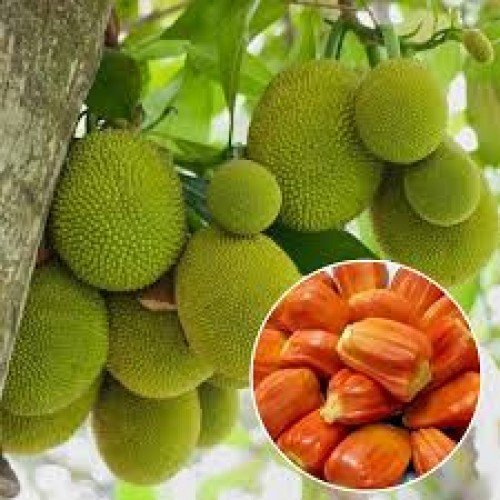off
-
Sold
-

out
Jackfruit Plant
The Jackfruit plant (scientifically known as Artocarpus heterophyllus) is a large, tropical tree native to India and Southeast Asia. Known for its enormous fruit, the Jackfruit is one of the largest fruits in the world, capable of growing up to 80 pounds or more. The fruit is known for its sweet, aromatic flavor when ripe and its meaty texture when unripe, making it an incredibly versatile ingredient in many culinary dishes. The Jackfruit tree is not only beneficial for its fruit but also offers a host of other advantages, making it a great addition to gardens in tropical and subtropical climates.
Plant Care Guide
Climate & Location
- Thrives in **tropical and subtropical climates** with **warm, humid conditions**
- Requires **full sunlight** to promote healthy growth and fruit production
- The Jackfruit tree is **sensitive to frost**, and should be planted in frost-free regions with temperatures between **25°C and 35°C (77°F–95°F)**
Soil Requirements
- Prefers **well-drained, sandy or loamy soil** with a **neutral to slightly acidic pH** (5.5–7.0)
- Soil should be **rich in organic matter** for optimal growth
- Avoid **waterlogged soils**, which can lead to root rot
Watering
- Requires **regular watering**, especially in the dry season, but avoid overwatering
- Once established, the Jackfruit tree can tolerate brief dry spells but still needs consistent moisture during fruiting
- **Mulch** around the base of the tree to help retain soil moisture and regulate temperature
Fertilization
- Apply **balanced fertilizers** (such as NPK 10-10-10) during the growing season to encourage healthy growth
- Use **organic compost** or **well-rotted manure** to improve soil fertility
- Fertilize the tree after the fruiting season for the next growth cycle
Pruning & Maintenance
- Prune to remove **dead**, **damaged**, or **diseased branches** to promote better airflow and light penetration
- Prune the tree to maintain an **open canopy**, which helps with fruit production
- Regularly inspect the tree for signs of pests or diseases and treat as needed
Pest & Disease Control
- **Common pests**: Aphids, caterpillars, fruit flies, and scale insects
- Use **organic insecticides** or **neem oil** to control pests
- Jackfruit trees may also be affected by **fungal diseases** like **root rot** and **leaf spot**, which can be controlled with proper care and spacing
Advantages of the Jackfruit Plant
Nutritional Benefits
- **Rich in nutrients**, including **Vitamin C, potassium, fiber**, and **antioxidants**
- The fruit contains **high levels of carbohydrates** and can provide **energy** for long periods
- **Unripe jackfruit** is a popular meat substitute due to its texture, making it ideal for vegetarians and vegans
High Yield Potential
- The Jackfruit tree can begin to produce fruit within **3–5 years** if properly cared for
- **Abundant fruit** production: A single tree can produce up to **100–200 fruits per year** once it reaches maturity
- The fruit is incredibly **versatile**: can be consumed fresh, dried, juiced, or used in various culinary dishes
Environmental Benefits
- The tree’s dense canopy provides **shade** and can help reduce heat in tropical gardens
- Its **large root system** helps in **soil stabilization**, preventing erosion in tropical and subtropical regions
- The Jackfruit tree is also known for its ability to **sequester carbon**, contributing to better air quality
Ornamental Value
- The Jackfruit tree is **large and attractive**, making it a stunning addition to any tropical landscape
- The tree produces **large, attractive leaves** and clusters of **small, fragrant flowers** that add to its ornamental appeal
Low Maintenance
- Once established, Jackfruit trees are **relatively low-maintenance**
- The tree is **drought-tolerant** once mature, requiring less frequent watering during the dry season
- It is **resistant to many pests** compared to other tropical fruit trees
Conclusion
The Jackfruit plant is a magnificent tree that offers a multitude of benefits, both for gardeners and culinary enthusiasts. Its **large, nutritious fruits**, **low-maintenance care**, and **environmental benefits** make it a perfect addition to tropical and subtropical gardens. Whether you’re growing it for its sweet, edible fruit or its ornamental value, the Jackfruit tree provides an abundance of rewards and is sure to thrive in the right conditions.

